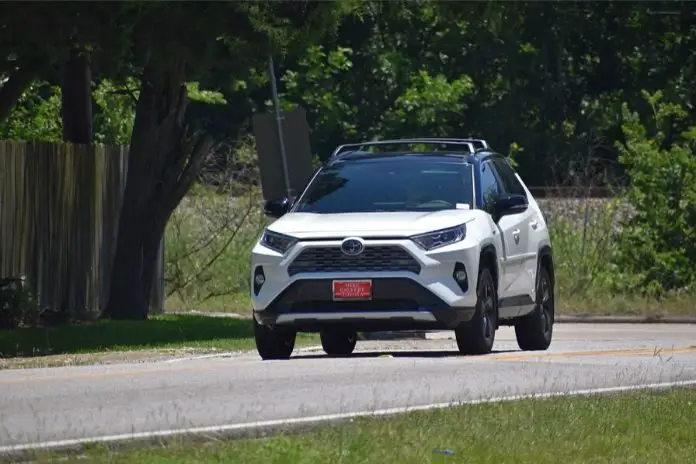
The Toyota RAV4 has been one of the most iconic models released by the famous Japanese brand. Since its release last 1994, it has been one of the best-selling vehicle models in various countries. Due to this, Toyota decided that it is a model that deserves a hybrid remodel, making its debut in 2016.
The RAV4 hybrid offers a lot of exceptional upgrades, from its mean-looking exterior, roomy seats, and large compartments to excellent city fuel efficiency. The RAV4 is even way better and a far cry from when it was first introduced. However, one of the most common concerns about its hybrid battery.
How long do Toyota RAV4 hybrid batteries last? According to Toyota, all hybrid vehicles they offer are equipped with a hybrid battery that can last at least ten years or 100,000 miles before signs of wear appear. So, a hybrid RAV4 will have a hybrid cell that will give you at least ten years of smooth driving or 100,000 miles.
Toyota also states that the life expectancy of their hybrid batteries depends on a lot of factors, including driving style, climate, and the environment. The colder the natural weather in your location, the quicker the life of hybrid batteries reduce.
The fact that I found you here reading my article tells me that it is either you are an owner of a Toyota RAV4 hybrid or just planning to buy one. In most cases, people ask questions about how long hybrid batteries last are owners of one or a potential buyer.
Well, in either case, you already got the answer you are looking for. However, if you wish to learn more about Toyota hybrid batteries, I recommend you to stay.
Essential Things to Learn About Hybrid Car Batteries
The evolution of hybrid vehicles never stops, thanks to the relentless pursuit of excellence by car manufacturers as one of the best alternatives to cars powered by fossil fuels through combustion engines, these hybrid vehicles are integrating both the gasoline and electric powertrains. Due to this, the fuel efficiency of these automobiles has never been better today.
Hybrid cars are more desirable today compared to battery-only vehicles. This is because combining the electric-powered motors to the traditional gas engine produces a more functional system as vehicles having the conventional system that uses a gas engine and a 12-volt battery, plus an additional electric battery. Hybrids have the ability to switch from one power source to another seamlessly.
This exceptional ability of hybrids makes them more fuel-efficient, allowing them to consume 20% to 35% less fuel. It also enables them to reduce their carbon emission, making them more eco-friendly significantly.
Understanding the Anatomy and Structural Build of a Hybrid Battery
Like any other battery, a hybrid battery is consists of two electrodes and an electrolyte. What makes it different from the traditional batteries is that it has multiple battery cells that allow it to store more charge and generate more power.
However, the way it works is also similar to the traditional batteries, where the ions from the positive charge travel to the negative electrode to generate power.
A typical hybrid battery is designed to last up to eight years, while other manufacturers like Toyota use a more advanced cell technology, allowing them to produce batteries with ten years of life expectancy. The lifespan of a hybrid battery is also measured in mileage where generally goes up to 100,000 miles.
The Common Factors that Affects the Lifespan of Hybrid Batteries
Earlier, I mentioned something about the factors that can significantly affect a hybrid battery life expectancy. And yes, there are indeed several factors that have a significant impact on a hybrid battery’s lifespan.
Learning about these factors will make you aware of these factors, but it will also give you an idea of taking good care of the battery. This will allow you to take the necessary steps on how you can preserve your hybrid cell and get the most out of it.
Come and join me as we both discover these factors!
1. Time the Battery is Used for Driving, and It Is Charged
It is an established fact that no battery will last forever, and there will come a time that a battery will lose its ability to store charge. Same goes with a hybrid car battery, the more it is drained and the more it has to be recharged, the more it inches closer to its slow and impending doom.
So, limiting its driving time will reduce its need to recharged. Switching to it only if necessary and in ideal driving conditions like when you got stocked in traffic will be a great idea. It will significantly extend its service life and allow you to get the most out of it.
2. Driving Style and Driving Attitude
According to most car manufacturers producing hybrid vehicles, one factor that significantly affects the battery life of hybrid batteries is the style of driving. If you are the kind of driver with an erratic approach, where you are used to crunching the pedal every chance, you can get, or you love taking off all of a sudden.
That kind of driving stresses the battery and wears it down quickly. Battery experts recommend conservative driving to preserve hybrid batteries. And slow takeoffs are good for their health because they will not force it to deliver huge amounts of power in short bursts, which actually put strains on it.
3. Improper Recharging of the Battery
Like any other battery, hybrid car cells also deteriorate a lot faster when they are not properly charged. One of the misconceptions when it comes to hybrid car batteries is that keeping it a fully recharged state (100%) and charging it with below 20% left is good for the battery.
This is NOT the case. When a hybrid cell is always charged at its full state, it drains a lot faster when it is used. This stresses the battery. Manufacturers recommend that the battery charge level be kept within the 20% to 80% range to optimize its life expectancy. The following will be great for preserving the battery.
4. Extreme Climate or Weather Conditions
We all know that extreme temperatures greatly affect battery life; being exposed to very hot and cold temperatures reduces battery life. Many hybrid owners say that freezing winter days can reduce the holding charge’s ability up to 30%.
On the other hand, although warmer climates are better for the battery, very hot temperatures are also bad for hybrid batteries. The toll of hot weather can be unnoticeable, but they wear it will take effect when the colder climate starts to come.
To combat this factor, try to park your hybrid car on places with ideal ambient temperatures and try to keep it from being exposed to direct sunlight.
Learning More About the Warranty Policy of Toyota Hybrids
All hybrid vehicles offered by Toyota come with their standard warranty policy that covers the car along with its battery for eight years or 100,000 miles, on whichever comes first basis.
What makes it better is that Toyota announced good news last 2019, that they are extending the coverage of their hybrid warranty to 10 long years or 150,000, whichever of them comes first.
This warranty extension covers all 2020 hybrid systems as well as a lineup of models consisting of seven chosen hybrids and one model with a fuel cell system.
This lineup includes:
● The fourth-generation Toyota Prius
● Prius Prime, a popular plug-in hybrid
● The Corolla hybrid which is the first one
● Camry hybrid, third-generation
● RAV4 hybrid, second generation
● The premium sedan Avalon hybrid
● New Highlander hybrid 2020 model
● Toyota Mirai, the current generation
All of these models will be covered under the new ten year or 150,000 miles standard warranty, whichever comes first. This will include part replacement, free repairs, and service, provided that damages are not due to abuse, natural wear, and misuse.
However, for the hybrid control module, battery control module and inverter with converter, they will be covered by the old warranty policy of 8 years and 100,00 miles.
Final Thoughts
I hope you found this article helpful and cleared out some of the questions that you have in mind. Just to refresh your memory, a RAV4 hybrid battery is expected to last up to 10 years or 100,000 driving miles, according to Toyota.
All of their hybrid vehicles use a battery designed to last all those years, but it is a reminder that several factors can affect battery life. All of them included above.





